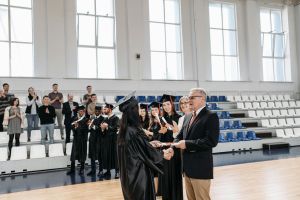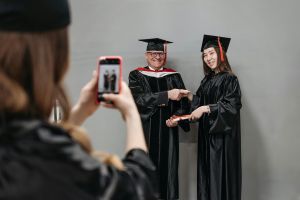What is the EB1B Visa?

The EB1B visa, also known as the “Outstanding Professors and Researchers” visa, is a special immigration category for those who have achieved significant recognition in their academic fields. This visa is designed for individuals who are recognized internationally as outstanding in a specific academic area, allowing them to live and work in the United States. The EB1B visa requires a permanent job offer from a U.S. employer, making it ideal for scholars and researchers who wish to continue their work in the U.S. at a higher educational institution or a private employer with a strong research department.
EB1B Visa Requirements
To qualify for the EB1B visa, applicants must provide evidence of at least two of the following:
- Receipt of major prizes or awards for outstanding achievement.
- Membership in associations that require outstanding achievement.
- Published material in professional publications written by others about the applicant’s work.
- Participation as a judge of the work of others in the same or allied academic field.
- Original scientific or scholarly research contributions to the field.
- Authorship of scholarly books or articles in scholarly journals with international circulation.
Additionally, the applicant must have at least three years of experience in teaching or research in the relevant academic field, and the position offered in the U.S. must be a tenure-track teaching or a comparable research position.
Transitioning to the EB1B visa can be a critical move for L1A visa holders aiming to secure a permanent role in the U.S. academic or research community.
The EB1B Visa Application Process
The application process for the EB1B visa involves several steps:
- Initial Consultation and Eligibility Assessment: Evaluate whether you meet the criteria for the EB1B visa by reviewing your academic achievements and identifying the best evidence to support your application.
- Gathering Evidence: Collect and organize documentation that demonstrates your outstanding achievements in your academic field.
- Filing Form I-140: Submit Form I-140, Immigrant Petition for Alien Worker, along with your evidence to USCIS.
- USCIS Review: USCIS will review your petition and may request additional information. It is crucial to respond promptly and comprehensively to any Requests for Evidence (RFEs).
- Approval and Adjustment of Status: If your I-140 petition is approved, you can either apply for adjustment of status if you are already in the U.S., or apply for an immigrant visa at a U.S. consulate if you are abroad.
Rights and Obligations of an EB1B Visa Holder
As an EB1B visa holder, you gain several important rights and responsibilities:
- Rights:
- Live and work permanently in the United States.
- Apply for a Green Card for your spouse and unmarried children under 21.
- Travel in and out of the U.S. without restrictions.
- Work in a permanent academic or research position.
- Obligations:
- Maintain your status by continuing to work in your academic or research field.
- Comply with U.S. laws and regulations, including tax obligations.
- Update USCIS about any changes in your address or employment status.
Common Reasons for Denial of an EB1B Visa
EB1B visa applications can be denied for various reasons:
- Insufficient evidence of outstanding achievements.
- Inadequate documentation or poorly organized petition.
- Failure to meet the minimum required criteria.
- Inconsistent or unclear evidence of academic contributions.
At EB1 Visa Services, we believe in your academic potential and are committed to helping you showcase your achievements to achieve your immigration goals.
Bringing Dependents to the USA on an EB1B Visa
EB1B visa holders can bring their immediate family members to the United States. This includes:
- Spouse: Your spouse can apply for a derivative visa, allowing them to live and work in the U.S.
- Children: Unmarried children under the age of 21 can also apply for a derivative visa, enabling them to live, study, and eventually work in the U.S.
EB1B Processing Time
The processing time for an EB1B visa can vary depending on the complexity of your case and the current workload at USCIS. On average, the process can take anywhere from 8 to 23 months, including the time needed to prepare and submit your petition, the USCIS review period, and any necessary adjustments of status or consular processing.
How Do EB1 Visa Services Help You?
EB1 Visa Services, part of Bay Area Immigration Services (BAIS), is dedicated to helping you navigate the EB1B visa application process with ease. Our team of experienced professionals understands the intricacies of the immigration system and is here to support you every step of the way. From the initial consultation and eligibility assessment to gathering evidence and preparing your petition, we provide personalized guidance tailored to your unique situation. Our goal is to make the process as smooth and stress-free as possible, helping you achieve your dream of living and working in the United States.
Our Process
- Initial Consultation: We assess your eligibility and discuss your academic achievements and goals.
- Document Collection: We help you gather the necessary evidence and organize it effectively.
- Petition Preparation: We prepare and file your Form I-140 petition with USCIS.
- USCIS Communication: We handle any requests for additional information and keep you updated throughout the process.
- Adjustment of Status or Consular Processing: We guide you through the final steps to obtain your Green Card.
Source: www.uscis.gov
Frequently Asked Questions
Eligible individuals include outstanding professors and researchers who are recognized internationally for their academic achievements in a specific field.
Applicants must provide evidence of international recognition, such as published materials, citations, research contributions, awards, and letters of recommendation from experts in their field.
Yes, a job offer from a U.S. employer is required for an EB1-B visa. The employer must file the petition on behalf of the applicant.
Benefits include priority processing, no labor certification requirement, and a direct path to a Green Card for permanent residency.
Processing times can vary, but it generally takes about 6-12 months from filing the I-140 petition to approval.
Yes, your spouse and unmarried children under 21 can apply for derivative visas and accompany you.
Key criteria include international recognition in the academic field, at least three years of teaching or research experience, and a permanent or tenure-track position at a U.S. institution.
Yes, if you are in the U.S., you can file for adjustment of status (Form I-485) after your I-140 petition is approved.
The EB1-A is for individuals with extraordinary ability and allows for self-petitioning. The EB1-B is for outstanding professors and researchers and requires a job offer from a U.S. employer.
No, the EB1-B visa does not require a Labor Certification, which simplifies and speeds up the process compared to other employment-based visas.
Common reasons include insufficient evidence and poorly organized petitions.
The processing time for an EB1B green card can range from 8 to 23 months, depending on various factors such as the complexity of the case and the current workload at USCIS.



